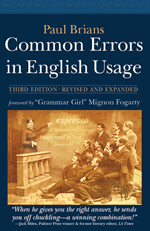Seeking to avoid prejudging the facts in a crime and protect the rights of the accused, reporters sometimes over-use “alleged” and “allegedly.” If it is clear that someone has been robbed at gunpoint, it’s not necessary to describe it as an alleged robbery nor the victim as an alleged victim. This practice insultingly casts doubt on the honesty of the victim and protects no one. An accused perpetrator is one whose guilt is not yet established, so it is redundant to speak of an “alleged accused.” If the perpetrator has not yet been identified, it’s pointless to speak of the search for an “alleged perpetrator.”
Back to list of errors

BUY THE BOOK!
